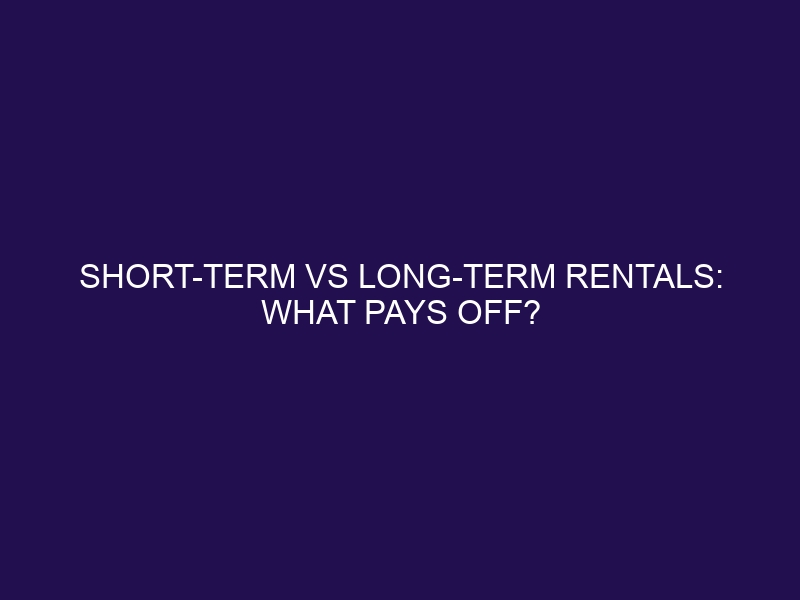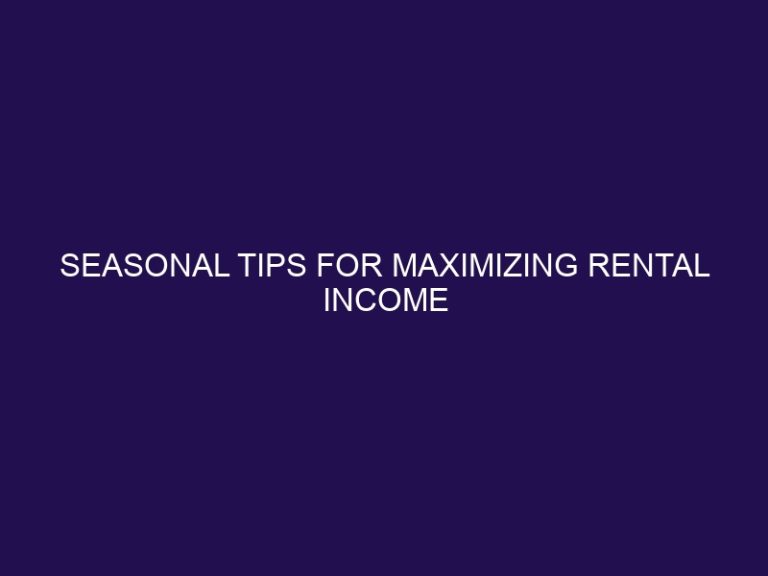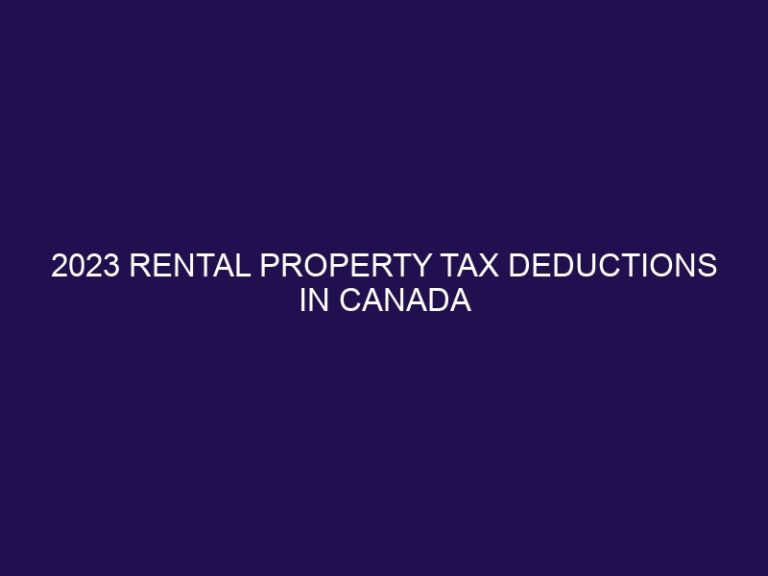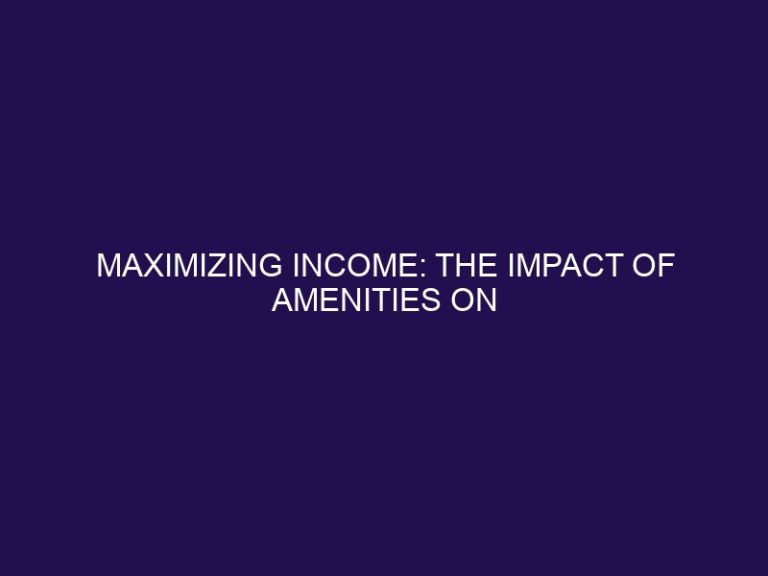Short-Term vs Long-Term Rentals: What Pays Off?
When it comes to renting out a property, landlords have the option of short-term or long-term rentals. Short-term rentals typically refer to renting out a property for a period of less than 6 months, while long-term rentals are for a period of 6 months or more. Both options have their own set of pros and cons, and it’s important to weigh them carefully to determine which option is more profitable for you.
Short-term rentals, also known as vacation rentals, are becoming increasingly popular with the rise of platforms like Airbnb. Some potential advantages of short-term rentals include:
- Higher Rental Income: Short-term rentals often have higher rental rates compared to long-term rentals, allowing for a potential increase in income.
- Flexibility for Property Use: With short-term rentals, landlords have more flexibility to use the property for personal use or to rent out to friends and family.
- More Wear and Tear on Property: Short-term rentals typically have more turnover and guests, resulting in more wear and tear on the property.
- More Time and Effort for Management: Managing short-term rentals can be more time-consuming and require more effort, especially with frequent guest turnover and the need for constant communication and upkeep.
On the other hand, long-term rentals also have their own set of advantages, such as:
- Stable Rental Income: With a long-term rental, landlords can expect a stable and consistent monthly rental income.
- Less Wear and Tear on Property: Since long-term rentals have less turnover, the property may experience less wear and tear.
- Less Time and Effort for Management: Long-term rentals typically require less time and effort for management, as there is less need for constant communication and upkeep.
- Limited Flexibility for Property Use: Landlords may have less flexibility with the use of their property with long-term rentals, as they are typically only used for residential purposes.
The profitability of short-term and long-term rentals can vary depending on factors such as location, market demand, and property type. It’s important to consider these factors when deciding which option may be more profitable for you.
It’s also important to consider the legal and tax implications of both types of rentals. Short-term rentals may have stricter regulations and may require permits or licenses, while long-term rentals may have different tax implications. It’s important to research and understand these implications before making a decision.
Ultimately, the type of rental that is better for your property depends on your specific circumstances and preferences. Consider factors such as the type of property you have, your financial goals, and your personal preferences when deciding which option may be more suitable for you.
What Are Short-Term and Long-Term Rentals?
Short-term and long-term rentals refer to accommodations that are rented for either a brief period or an extended duration, respectively. Short-term rentals typically last a few days to a few months, while long-term rentals can last for a year or more. Short-term rentals offer flexibility, while long-term rentals provide stability and the opportunity for potential cost savings.
What Are the Pros and Cons of Short-Term Rentals?
As the world of vacation rentals continues to grow, the debate between short-term and long-term rentals becomes more relevant. In this section, we will discuss the pros and cons of short-term rentals, examining both the potential benefits and drawbacks. From the potential for higher rental income to the added wear and tear on the property, we will cover all aspects of short-term rentals to help you make an informed decision for your property.
1. Higher Rental Income
- Improve property appeal to attract higher-paying tenants.
- Provide additional amenities to justify premium rates.
- Consistently review rental rates in the local market for competitive pricing.
2. Flexibility for Property Use
- Assess the flexibility of property use according to your own needs and preferences.
- Consider the potential impact of short-term rentals on your personal or family use of the property.
- Review local regulations to ensure that the property use is in compliance with flexibility guidelines.
3. More Wear and Tear on Property
- Regular maintenance: Schedule frequent checks and repairs for the property to prevent wear and tear.
- Upgrade durability: Invest in high-quality, long-lasting fixtures and materials to minimize wear and tear.
- Security deposit: Collect a substantial deposit to cover potential damages caused by wear and tear.
A friend opted for long-term rentals after facing significant wear and tear on their property during short-term leases, resulting in high maintenance costs.
4. More Time and Effort for Management
- High turnover: Managing and cleaning short-term rentals requires frequent attention and effort.
- Guest communications: A significant amount of time is spent responding to inquiries, check-ins, and feedback from guests.
- Property maintenance: Regular inspections and upkeep are necessary to accommodate the quick turnovers of short-term guests.
What Are the Pros and Cons of Long-Term Rentals?
When considering whether to rent out a property for the short-term or long-term, it’s important to weigh the pros and cons of each option. In this section, we will focus specifically on the advantages and disadvantages of long-term rentals. From the stability of rental income to the potential for less wear and tear on the property, we’ll explore the various factors that can impact the profitability and management of long-term rentals. Additionally, we will discuss the limitations that come with committing to long-term tenants and the impact it can have on the flexibility of property use.
1. Stable Rental Income
- Choosing long-term rentals guarantees a stable flow of rental income, providing a reliable and consistent source of earnings for property owners.
Fact: Long-term rentals offer a consistent stream of income, ensuring financial stability for property owners.
2. Less Wear and Tear on Property
- Regular maintenance: Conduct routine checks and repairs to prevent deterioration and decrease wear and tear on the property.
- Longer tenant stays: Decrease turnover frequency to minimize property usage and reduce property damage.
- Strategic tenant selection: Choose responsible, long-term tenants to mitigate property damage and maintain the property’s condition.
Pro-tip: Consider offering incentives for tenants who maintain the property well.
3. Less Time and Effort for Management
- Automated Processes: Utilize property management software for streamlined operations.
- Reduced Turnover: Long-term rentals typically involve less frequent tenant turnover, minimizing management efforts.
- Maintenance Stability: Long-term rentals often require less frequent and predictable maintenance, reducing management time and effort.
3. Less Time and Effort for Management
4. Limited Flexibility for Property Use
When considering long-term rentals, it’s important to note that there may be limited flexibility for property use. This can restrict personal use or sudden property changes. However, it also ensures stable and consistent occupancy, making it a suitable option for property owners looking for a reliable and less variable rental income stream. So, if you’re seeking a secure and predictable investment, long-term rentals may be the way to go.
Which Type of Rental is More Profitable?
Short-term rentals can offer higher profits due to their flexibility, high demand, and potential for premium pricing during peak seasons. On the other hand, long-term rentals provide a stable and consistent income with fewer turnovers and lower maintenance costs, making them ideal for investors seeking steady and predictable returns. So, which type of rental is more profitable?
What Factors Affect the Profitability of Short-Term and Long-Term Rentals?
What Factors Impact the Profitability of Short-Term and Long-Term Rentals?
Factors that can impact the profitability of short-term and long-term rentals include:
- Location
- Seasonality
- Property type
- Management costs
- Occupancy rates
- Local regulations
While short-term rentals may yield higher income in tourist areas, long-term rentals offer stability. Other factors such as property management fees, property condition, and demand fluctuations can also have an influence on profitability.
What Are the Legal and Tax Implications of Short-Term and Long-Term Rentals?
When it comes to renting out your property, there are two main options: short-term or long-term rentals. Each comes with its own set of legal and tax implications that landlords should be aware of. In this section, we’ll break down the regulations for both short-term and long-term rentals and discuss the key differences in taxation. By understanding the legal and tax implications, landlords can make an informed decision on which type of rental is best for their property.
1. Short-Term Rental Regulations
- Check local zoning laws and homeowner association regulations.
- Confirm licensing and permitting requirements for short-term rentals.
- Understand tax obligations for short-term rental income.
- Comply with safety and health regulations for short-term rentals.
When navigating short-term rental regulations, it is crucial to conduct thorough research and adhere to all legal requirements in order to successfully manage your property.
2. Long-Term Rental Regulations
Long-term rental regulations typically encompass a variety of aspects, including lease agreements, tenant rights, and eviction procedures. It is the responsibility of landlords to adhere to local laws concerning security deposits, habitability standards, and rent control in order to ensure fair treatment of tenants and proper maintenance of the property. These regulations may differ depending on the jurisdiction, therefore it is important for landlords to have a thorough understanding of the rental laws in their specific area.
3. Tax Differences
- Short-term rentals may be subject to higher tax rates due to their classification as business income.
- Long-term rentals are typically taxed at a lower rate as they are considered passive income.
- Consult a tax professional to understand the specific tax implications for your rental property, including the differences in tax rates.
Pro-tip: Understanding the tax differences can help you make informed decisions on your rental property investments.
Which Type of Rental is Better for Your Property?
Consider the benefits of short-term rentals for higher income potential, property flexibility, and tax advantages. However, long-term rentals offer stability, less turnover, and reduced management.
Fact: Short-term rentals can generate 30% more income annually compared to long-term rentals.
Which type of rental is better for your property?
What Type of Property Do You Have?
Consider the type of property you own. For example, if it is a vacation home located near popular tourist attractions, short-term rentals may be more profitable. However, if it is a residential property in a stable neighborhood, long-term rentals may be a better option. It is important to assess the nature of your property.
What Are Your Financial Goals?
Consider your financial objectives when deciding between short-term and long-term rentals. If you have immediate high income as your goal, then short-term rentals may be the best option. However, if you prefer stable and consistent income, then long-term rentals would be more favorable. Ultimately, your financial goals will determine the ideal rental strategy for you.
What Are Your Personal Preferences?
Consider your lifestyle, travel frequency, and property management capacity when determining the rental type that aligns with your personal preferences.
Summary
Short-term rentals offer flexibility for travelers, while long-term leases provide stable income for property owners. When deciding between the two, it’s important to consider the property’s location and market demand.
A pro-tip is to diversify your real estate portfolio by incorporating a mix of short-term and long-term rentals, which can help maximize profitability.
Frequently Asked Questions
What is the difference between short-term and long-term rentals?
The main difference between short-term and long-term rentals is the length of the rental period. Short-term rentals are typically rented for one night to one month, while long-term rentals have a lease of 12 months or longer.
What are the distinct advantages of short-term rentals?
Short-term rentals offer higher potential income, flexibility and better maintenance compared to long-term rentals. They also allow the owner to block off dates for personal use and have less wear and tear due to regular cleaning and turnover.
What are the benefits of long-term rentals?
Long-term rentals provide a stable and consistent income, with lower tenant turnover and easier financing. They also require less management and marketing efforts. However, they may have lower rental rates and stricter regulations to comply with.
How should investors decide between short-term and long-term vacation rentals?
The decision between short-term and long-term rentals depends on the investor’s goals and the specific market. Short-term rentals may be more suitable for investors seeking flexibility and control, while long-term rentals may be better for those looking for stable and consistent income.
What are some key takeaways when considering short-term versus long-term rentals?
Investors should carefully weigh the unique benefits and disadvantages of each strategy, research regulations and market trends, and carefully consider costs and potential profits before making a decision.
What are some potential risks to consider with short-term and long-term rentals?
Short-term rentals may have higher vacancy rates and require more management and marketing efforts. Long-term rentals may experience more wear and tear and have less control over the property. It is important for investors to research and understand these risks, as well as landlord-tenant laws.







